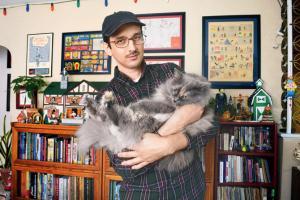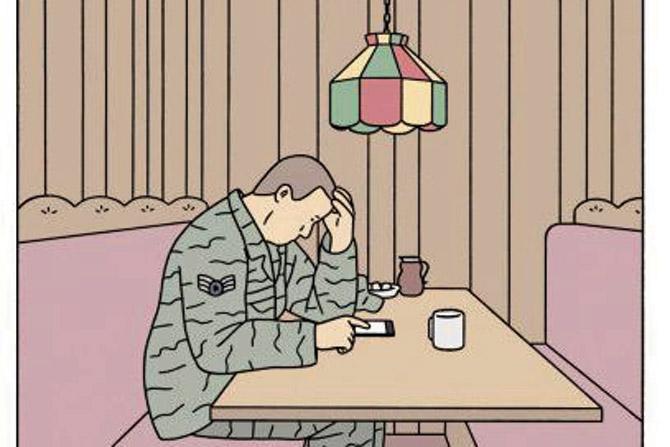Meet the man behind the first graphic novel in the race for the Man Booker Prize

Nick Drnaso with Olive, his cat. Pic/Chester Alamo-Costello
The beauty of reading a good book often lies in leaving things behind — your cup of hot coffee is now cold, the echoes of a not-so distant time (or a mother's yell) soon follow, until the realisation dawns that you've left yourself behind. The world is back in order until you find the next good read. But Sabrina is beyond that. It is more than just a riveting account of a young woman's disappearance and its aftermath. And unlike most novels we encounter, this one doesn't settle on a middling question like, "Who is responsible?" Nick Drnaso's graphic novel delves into the face of an orderly world, which leaves us hanging on grief, insignificance and the brevity of life. It wasn't a long while ago when we thought words were the most powerful form of expression, but then along came a 29-year-old Chicagoan cartoonist who knows better. Extracts from an interview.
ADVERTISEMENT
Beverly, your debut novel is a grim look at suburban life, where you rip through the facade of normalcy. Sabrina, in a way, does the opposite. How did you transition from Beverly to Sabrina?
I remember being eager about Sabrina even as I was finishing Beverly. I had a certain approach to drawing comics in place and I felt like I was ready to write a more involved story. I can't really remember if I was thinking about how the two books would pair with each other; neither of them were really planned out or conceptualised in that way.

A panel from Sabrina. Pic/Nickdrnaso.Tumblr.com
There is an empathetic connection one feels with the characters. How challenging was it to absorb what you had written?
There was always a gnawing fear that the whole thing was not genuine. I faced difficulties drawing characters suffering through something that I have never experienced. It felt kind of exploitative. I'm still uncomfortable with that. But I did try as hard as I could to imagine certain scenarios. I also read interviews and writing from people who had gone through similar tragedies, but it really is impossible to imagine what a tedious day of grief feels like.
Keeping in mind the sensitivity built around the novel's theme, were there any concerns about coming off as too preachy?
Oh yes, constantly. I started working on the book in late 2014 and the cultural landscape has changed a lot since then. I might tweak some of the dialogue if I had to do it over again. For instance, I kind of cringe when I read something that refers to the conspiratorial radio host as a "right-winger". That makes me feel like I didn't do my job properly. I never had a thought that this was a political book, and I didn't want to write a caricature of a certain type of personality, so maybe I failed in that regard.
Has the writing process in any way changed your outlook of the world?
I've developed the attitude that I'm the dumbest person in the room, and that helps with the kind of blind certainty that kicks in when you think your opinion is solid or you have something meaningful to say. Even this question is kind of embarrassing, because I don't feel like I should be pontificating about having a healthy worldview. I'll try and answer your question, I felt more confused after finishing this book, and certainly didn't feel like I had some kind of tidy prescription for anything.
Your drawings are deceptively simple. Had you clearly decided on the art style and setting you wanted to establish?
Yes, I think it was pretty clear in my mind from the start. I used a somewhat restrictive colour palette, and the grid and page size was a continuation of the way I had drawn some of the stories in my first book. I remember not wanting to dwell too much on those decisions and transition smoothly from Beverly to Sabrina.
I also took a trip to Colorado Springs to visit a friend in the Air Force and take photo reference for the book. Certain elements of his life were borrowed, and the house he lived in was copied almost exactly in the book, so those photos became my aesthetic guidebook.
You're the first graphic novelist in the running for the Man Booker prize. To put it simply, what is the role of the graphic novelist in modern society? Is the literary circuit rethinking the genre?
I'm not insisting I deserve a place anywhere, and I certainly never thought the medium was unappreciated or deserved more legitimacy. I guess I've been pretty insulated in my comics bubble [sic] in a way I hadn't realised, I just don't hear a lot of conversations about this. They are different mediums, so I understand the frustration some have with Sabrina being nominated. I didn't put the book up for the award, and I'm sort of embarrassed by that kind of attention.
There is a strange complacency with the ending. What do you hope readers take away from Sabrina?
I'm really not sure. It felt like a logical place to end the story, but I understand if it's dissatisfying to some people. As I mentioned, there wasn't really any resolution for me as the author, so it's hard to know if a reader would be able to gain anything from this book.
Any Indian writers or graphic novelists who you're familiar with?
Oh boy, seriously, I don't think I'm aware of a single one. I'm so sorry, that's embarrassing. I'll gladly take any recommendations!
Catch up on all the latest Crime, National, International and Hatke news here. Also download the new mid-day Android and iOS apps to get latest updates
 Subscribe today by clicking the link and stay updated with the latest news!" Click here!
Subscribe today by clicking the link and stay updated with the latest news!" Click here!






